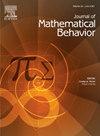19世纪中期至第一次世界大战期间,Gdańsk维多利亚女子中学的数学教学
IF 1.7
Q3 EDUCATION & EDUCATIONAL RESEARCH
引用次数: 0
摘要
本文旨在描述在19世纪下半叶和20世纪初在Gdańsk维多利亚大学的数学教学。虽然Gdańsk目前位于波兰,但在审议期间,它是普鲁士波兰的一部分,指的是普鲁士统治下的波兰土地,它以前被称为但泽。维多利亚中学成立于1818年,三年后成为Gdańsk第一所公立女子中学。在19世纪下半叶,这里还开办了一所师范学院。到20世纪初,由于当时的校长的努力,一个真正的女子体育馆开始运作,允许学生参加入学考试和大学学习。它成为普鲁士波兰最好的女孩教育机构之一。本文将比较维多利亚中学的数学教学与类似的男孩学校和其他在普鲁士波兰同时运营的选定的女孩学校的数学教学,包括比得哥什、Grudziądz、托鲁奇、马尔堡和科维津的机构。分析将集中在课程、长官命令、学校教科书、个别学校改革方案等方面。本文章由计算机程序翻译,如有差异,请以英文原文为准。
Mathematics teaching at girls’ Victoriaschule in Gdańsk from the mid-19th century until World War I
This paper aims to describe mathematics teaching at the Victoriaschule in Gdańsk during the second half of the 19th century and the early 20th century. Although Gdańsk is currently located in Poland, during the period under consideration it was part of Prussian Poland, which refers to the Polish lands under Prussian rule, and it was formerly known as Danzig. The Victoriaschule was established in 1818 and, three years later, became the first public secondary school for girls in Gdańsk. In the latter half of the 19th century, a teachers’ seminary was also opened there. By the early 20th century, due to the efforts of the then-director, a real gymnasium for girls began operation, allowing students to take matriculation exams and pursue university studies. It became one of the best educational institutions for girls in Prussian Poland. This paper will compare mathematics teaching at the Victoriaschule with that in similar schools for boys and other selected girls’ schools operating at the same time in Prussian Poland, including institutions in Bydgoszcz, Grudziądz, Toruń, Malbork, and Kwidzyn. The analysis will focus on curricula, ministerial orders, school textbooks, and the initiatives of individual school reformers.
求助全文
通过发布文献求助,成功后即可免费获取论文全文。
去求助
来源期刊

Journal of Mathematical Behavior
EDUCATION & EDUCATIONAL RESEARCH-
CiteScore
2.70
自引率
17.60%
发文量
69
期刊介绍:
The Journal of Mathematical Behavior solicits original research on the learning and teaching of mathematics. We are interested especially in basic research, research that aims to clarify, in detail and depth, how mathematical ideas develop in learners. Over three decades, our experience confirms a founding premise of this journal: that mathematical thinking, hence mathematics learning as a social enterprise, is special. It is special because mathematics is special, both logically and psychologically. Logically, through the way that mathematical ideas and methods have been built, refined and organized for centuries across a range of cultures; and psychologically, through the variety of ways people today, in many walks of life, make sense of mathematics, develop it, make it their own.
 求助内容:
求助内容: 应助结果提醒方式:
应助结果提醒方式:


